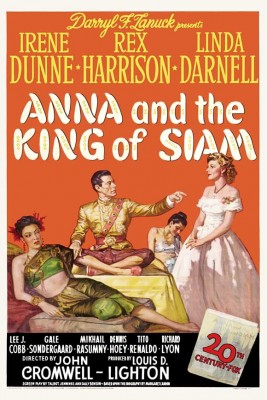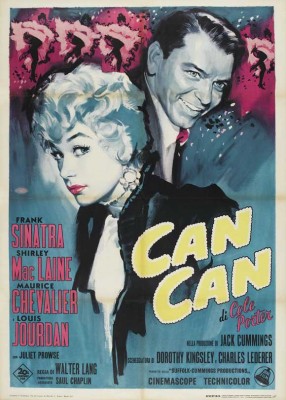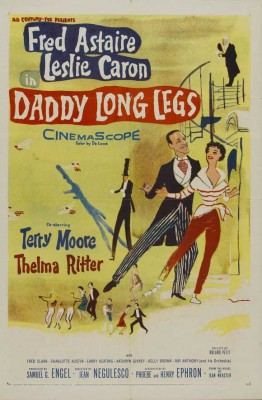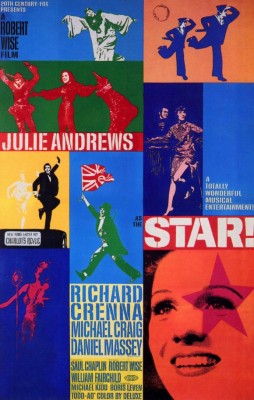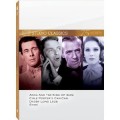| Reviews & Columns |
|
Reviews DVD TV on DVD Blu-ray 4K UHD International DVDs In Theaters Reviews by Studio Video Games Features Collector Series DVDs Easter Egg Database Interviews DVD Talk Radio Feature Articles Columns Anime Talk DVD Savant Horror DVDs The M.O.D. Squad Art House HD Talk Silent DVD
|
DVD Talk Forum |
|
|
| Resources |
|
DVD Price Search Customer Service #'s RCE Info Links |
|
Columns
|
|
|
20th Century Fox Studio Classics - Anna and the King of Siam / Can-Can / Daddy Long Legs / Star!
Whatever the reason this is an odd quartet of lesser films. If Fox had envisioned a quartet of musicals, why not include one Alice Faye, one Betty Grable, Gentlemen Prefer Blondes and maybe one of the Rogers & Hammerstein titles, surely a more representative selection?
Still, as I stated in my reviews of the boxed sets containing An Affair to Remember/Leave Her to Heaven/A Letter to Three Wives/Peyton Place and Anna Karenina/Les Misérables/A Farewell to Arms/The Sun Also Rises, the gradual decline of DVD has had at least one notable benefit for consumers. These recent Fox Home Entertainment quads, blatantly imitative of TCM/Warner Home Video's quadruple features, give film fans a lot of bang for their buck. With their RSPs of $19.98, that's less than $5 per DVD, less than what just one of these titles used to cost. Anna and the King of Siam is severely dated but an interesting cultural artifact and Daddy Long Legs underrated and entertaining. While Can-Can and especially Star! are quite bad, those with a road accident-like curiosity for misguided Hollywood productions will find they have much to offer as well.
Except for Can-Can, which is without the supplements-filled second disc that accompanied that stand-alone DVD, these are the very same discs with the same abundance of extra features, often several hours worth per film: audio commentaries, A&E Biography episodes, original featurettes. If you've waited this long to start a classic film library, now's a good time to start.
Officially, these releases coincide with 20th Century-Fox's 75th Anniversary. Finding them at your local retailer or even on-line may not be easy, however. The sets apparently fall under the banner of 20th Century-Fox Studio Classics - 75 Years but they don't seem to be listed on Amazon. Addendum: Helpful readers on DVD Talk's discussion boards offer this link. Why this would be searchable under "Classic Quad" is anyone's guess.
Anna and the King of Siam is a typically lavish and prestigious Fox production from the 1940s, the kind of thing studio head Darryl F. Zanuck would occasionally proudly slap his famous moniker on (see above). The film was adapted from Margaret Landon's 1944 book that in turn was based on the memoirs of Anna Leonowens (1831-1915), who for about six years served as governess and English teacher in the Royal Court of Siam (later Thailand) under King Mongkut.
The film stars Irene Dunne as the governess, renamed Anna Owens, Rex Harrison as King Mongkut, with Linda Darnell, Lee J. Cobb, and Gale Sondergaard as various Siamese.
Though casting Caucasians in Asian roles was commonplace in Hollywood at this time - this was, after all, also the era of Charlie Chan and Messrs. Wong and Moto, parts essayed by non-Asians - Anna and the King of Siam takes this to new heights of absurdity. Though he delivers a delightful, nuanced performance, Rex Harrison never suggests anything other than a squinty-eyed Rex Harrison, while stocky, New York Jew Lee J. Cobb, cursed with a Cliff Richard-style hairdo, looks and sounds ridiculous.
World War II and the Occupation of Japan were rapidly changing things, but American understanding of Asian cultures was virtually nil in 1946. Siam might just as well have been another planet, and like the Arabian Nights-type movies then also in vogue, filmmakers unhesitatingly favored Asian exoticness over anything like cultural accuracy.
Furthering damaging the film, at least in hindsight, is it's grating paternal imperialism, a key flaw in The King and I as well, in which Anna continually lectures Siamese adults like children, expecting them to adapt to her western world view rather than the other way around. Not surprisingly, postwar Thai audiences found this and The King and I enormously offensive and banned both films. They also condemned Leonowens's and Landon's account of the former's relationship with King Mongkut, insisting (probably rightly) that she greatly exaggerated her influence in the Royal Court. (Sergei Hasenecz notes that, "since it's forbidden fruit, The King and I is an underground commodity in Thailand. Of the Thais I know here, almost all have gone out of their way to watch it once they were in the US.")
In any case, Dunne's and especially Harrison's delicious performances make this Anna and the King watchable, though today it's mainly of interest for Asian cultural historians rather than classic film fans. (** 1/2 out of *****)
Extra Features: A&E Biography: "Anna and the King: The Real Story of Anna Leonowens"; trailer (textless); Fox Movietone newsreel excerpt.
Adapted from the lesser Cole Porter Broadway musical, with a book by Abe Burrows, the 1960 film version of Can-Can made for an even lesser film. Set in the Montmarte dance halls of 1890s Paris, the plot was significantly altered to accommodate star Frank Sinatra, grumpily working off a Fox contract stalled when he walked off the set of Carousel several years earlier.
The 1953 musical is considered minor, and attempts in recent years to revive it generally have been unsuccessful. The original production is remembered chiefly for Michael Kidd's choreography and Gwen Verdon's star-making performance, rather than for Porter's songs, few of which could be considered standards today.
The film version may have been prompted by the success of another Gallic movie musical set in turn-of-the-century Paris, MGM's Gigi; both co-star Maurice Chevalier and Louis Jordan. Probably another factor was the by 1960 fading popularity of period films looking back at outdated technologies and mores with a mixture of amused nostalgia for the past and a smug superiority about the Space Age present (as in Around the World in 80 Days). This story revolves around the scandalous title dance, which 70 years before had French officials up in arms. In reality the cancan rarely was performed as many have assumed it was, without undergarments.
Ironically, this dated prudishness hit the jackpot publicity-wise when Soviet Premier Nikita Khrushchev famously visited its sets and decried perceived American decadence. Via 1890s France, anyway.
Can-Can the movie is flatly directed - journeyman Walter Lang is no Vicente Minnelli - this despite lensing in Todd-AO, Can-Can being just the fifth feature film made in the 65mm process (though The Alamo was being shot around this same time). Everything just sits there; in some ways it's even more static than than Joshua Logan's similarly pretty but lifeless film of South Pacific. There's much more energy in the five-minute cancan sequence in John Huston's fitfully exuberant Moulin Rouge (1952) than in all of Can-Can.
At the artificial center of things, Sinatra delivers another uncaring one-take-and-I'm-outta-here performance, though co-stars Shirley MacLaine, Julet Prowse (soon to star opposite Elvis in G.I. Blues), and Chevalier and Jordan try their best. (** 1/2)
Extra Features: None, save for an isolated score track. (This was originally a two-disc DVD with the extras on Disc 2, which is not included.)
For many years Daddy Long Legs was a Fred Astaire musical that for some reason was hard to see. It rarely turned up at revival houses and never seemed to air on television. But like virtually all major big studio films, the picture was eventually released to VHS and DVD though until this review I found myself avoiding it, probably because I expected something long and tedious like Silk Stockings (1957), Astaire's disappointing musical remake of Ninotchka, also set in part in Paris.
Happily, it's a bit closer at least in terms of spirit to Stanley Donen's Funny Face (1957), yet another '50s Astaire film set in Paris. Unlike that film, except for some second-unit photography Daddy Long Legs was shot on the Fox backlot and visually it lacks the arresting Richard Avedon-influenced visual style of Donen's film, but it's charming in much the same way.
The movie is another remake of Jean Webster's 1912 novel Daddy-Long-Legs, first filmed as a Mary Pickford vehicle in 1919, then for stars Janet Gaynor and Warner Baxter in 1931. But by far the best-known film version prior to Astaire's film was Curly Top (1935), a big hit for child star sensation Shirley Temple, though for obvious reasons (see below) the plot had to be reworked with the story's heroine divided between two characters in that version.
The 1955 film casts Astaire as freewheeling, unpretentious Millionaire Jervis Pendleton III, who as part of a stuffy international conference happens upon a rural orphanage in France, outside Paris. There he spies 18-year-old Julie Andre (24-year-old Leslie Caron) and immediately is taken with her sunny disposition, energy, and obvious talent. With the help of his long-suffering business manager (Fred Clark) and an American ambassador (Larry Keating)*, Pendleton becomes the girl's anonymous benefactor, arranging for her education at a New England girls college. Later, they fall in love.
What's that you say? Eighteen-year-old Julie does what with 56-year-old Fred - er, Jervis Pendleton? During the 1950s, as box office insurance it became commonplace to pair older leading men (Astaire, Gary Cooper, Humphrey Bogart) opposite much younger leading ladies; Audrey Hepburn, then in her twenties, starred with all three, to cite one such example. Understandably, Daddy Long Legs comes perilously close in turning Astaire into a dirty old man but, unlike most such films of this period, the film addresses their age difference head-on, and like his dancing, Astaire appears so effortlessly charming he never comes off as lascivious.
The dance numbers are less memorable, with nothing approaching the magic of, say, The Band Wagon or Royal Wedding but fairly entertaining. As he often did, Astaire adapted his choreography to his co-star's strengths, resulting in ballet and ballet-influenced dancing on Caron's part. A 12-minute "Nightmare Ballet" solo by Caron seems to go on forever, but in some ways is less pretentious than Gene Kelly's concurrent attempts to adapt that form of dance to film.
The shortcomings of the musical numbers are compensated by the film's generally under-appreciated wit, including some topical humor lost on today's audiences, and terrific CinemaScope photography (by Leon Shamroy) that really makes use of the extra-wide frame. (****)
Extra Features: Commentary by Ava Astaire McKenzie, Ken Barnes, and Johnny Mercer (the latter archivally); trailers (2); Fox Movietone newsreel excerpts.
Were it not for the unanticipated gargantuan success of The Sound of Music (1965), 20th Century-Fox would have been in far worse shape than MGM is now and might not exist at all. The profits reaped from that film offset one disastrous production after another for five solid years, and understandably the studio was anxious, desperate to bring together the key talent from that production, notably star Julie Andrews, director Robert Wise, and producer Saul Chaplin, for another trip to the well.
The result was Star!, a colossal, out-of-step-with-the-times flop, an anachronistic celebration (rather than standard Hollywood biopic) of West End entertainer Gertrude Lawrence (1898-1952). The film shoots for Dennis Potter-esque innovations, for instance opening with a filmed overture with a music hall-type orchestra slowly taking their seats in the pit before commencing, followed by a faux newsreel-type short (director Wise having edited Citizen Kane's similar opening) about Lawrence (Andrews), who then compares the "reel" life onscreen to her "real" life with the newsreel producer. There are no opening credits.
The rest of the film is little more than a series of vignettes, with musical standards intercut with fact-based and fictional accounts of her relationships with people like childhood friend Noël Coward (played by his godson, Daniel Massey), though Coward's homosexuality is barely hinted at.
With its endless costume changes, gaudy musical numbers that uncomfortably waver between a lavish period authenticity and like something out of Laugh-In, Star! in recent years has acquired something of a cult following, particular among gay film fans. And there is an undeniably fascinating quality to the film, straining almost successfully to be innovative and to push the genre into a new realm, while at other times so foolish and wrong-headed as to be almost flabbergasting.
It's a fascinating car wreck of the movie, much more so than the merely turgid Can-Can. Between the March 2, 1965 premiere of The Sound of Music and the July 18, 1968 premiere of Star! the movie business, the art of cinema, indeed the entire world had changed irrevocably, and Star! plays like it got caught in the taffy-pulling machine of history. (***)
Extra Features: All-star audio commentary by members of the cast and crew (probably the largest gathering of talent for such a thing outside MGM's 007 Special Editions); Silver Star!, a 25th Anniversary featurette; The Saga of 'Star!', an exhaustive step-frame text feature replicate from the laserdisc release; Julie Andrews and Daniel Massey screen tests; trailers and TV spots; still gallery.
Video & Audio
Though several films are preceded by dire warnings about transfer being made from the "best surviving" elements, everything looks great. Anna and the King of Siam looks fine in its original black and white, full frame format. Daddy Long Legs is an especially bright and colorful transfer of its original CinemaScope, while Can-Can and Star! look even better, drawn as they were from original 65mm Todd-AO elements.
Each release includes optional English and Spanish subtitles. Anna and the King of Siam includes mono English and Spanish audio, while Daddy Long Legs offers a 4.0 Dolby Surround mix, and mono French and Spanish tracks. Can-Can and Star! are presented in 5.0 Dolby Surround, the former also with 5.0 Dolby Surround in French and a mono Spanish track. Can-Can runs 141:53 including an Overture, Entr'actre, and Exit Music, while Star! runs 172:51 with its filmed Overture. The latter is a flipper disc, with extra features on Side Two.
Extra Features
See above.
Parting Thoughts
This is a real bargain though notably weaker than Fox's other multi-film offerings. Even so, there's much to offer and the set is Recommended.
* Fans of The George Burns and Gracie Allen Show will be amused to see Clark and Keating together. Clark played Burns & Allen's neighbor Harry Morton until 1953, at which point Clark left the series to do other things and was replaced by Larry Keating as Harry. This was done right on the show, with Burns stepping out of character (sort of), breaking the "fourth wall," and with Clark and Keating on either side of him, Burns telling the audience something like, "Well folks, Fred Clark is leaving and from now on Harry Morton will be played by Larry Keating!"
Stuart Galbraith IV's latest audio commentary, for AnimEigo's Musashi Miyamoto DVD boxed set, is on sale now.
|
| Popular Reviews |
| Sponsored Links |
|
|
| Sponsored Links |
|
|
| Release List | Reviews | Shop | Newsletter | Forum | DVD Giveaways | Blu-Ray | Advertise |
|
Copyright 2024 DVDTalk.com All Rights Reserved. Legal Info, Privacy Policy, Terms of Use,
Manage Preferences,
Your Privacy Choices | |||||||









